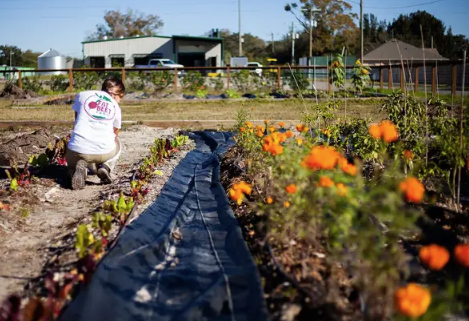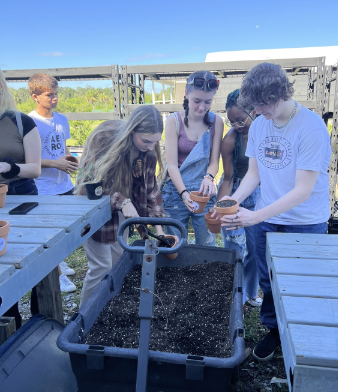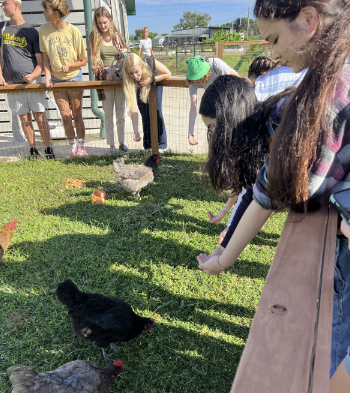Field trip to Fat Beet Farm, a sustainable farm and cafe

December 9, 2022
Fat Beet farm is a local sustainable farm that offers field trips to students, demonstrating
the affect farming has on the environment. They use sustainable practices, natural resources, and
demonstrate how to farm in an environmentally friendly way. Mrs. West teaches AP Human
Geography at Tarpon Springs High School. She recently took students on a field trip to Fat Beet
Farm to teach them about sustainable farming. While there, they were also able to enjoy the
delicious Fat Beet Farm Kitchen and Bakery with organic and natural foods and they were even
able to pet some of the farm animals. 
The tour focused on the use of sustainable farming practices. The tour guide, Kaitlyn
Davis, began with a discussion about their biodigester, a machine that takes daily waste from
their farm and restaurant, transforming it into an organic fertilizer overnight!
“All our food waste from our kitchen, and crops are “fed” to the mouth of our digester and are ground into a pulp and mixed with water. The food waste slurry is then pumped into the first tank to begin the digestion process. As anaerobic enzymes break down the food, it bubbles over into the second tank to finish the digestion process. Everything is completely digested within 24 hours. The two
amazing outputs that we collect from the bio-digester are a nutrient-dense natural fertilizer
slurry and methane gas,” Kaitlyn stated.
This process allows them to avoid waste while providing them with free and organic fertilizer.
In Mrs. West’s Human Geography class, students are learning about sustainability and
have watched educational videos on the importance of not depleting water resources. Using
rainwater is beneficial for the environment as it is natural and reoccurring. Fat Beet Farms is a
local example of a farm that utilizes rainwater. This provides them with free water and benefits
the environment.
Kaitlyn elaborated, “Rain collection is essential for the success of our Farm.
Our many tanks, totaling over 35,000 gallons, run our multiple grow systems, soil farming, & our;
our biodigester. Without capturing the rain from our Florida storms, our farm would not be able
to sustain our water needs.”
In addition to this, Fat Beet Farm enriches their soil through natural processes.
Kaitlin Davis told the group, “In Florida, we face unique challenges that are constantly
growing. The soil is often very sandy, and flooding/puddling is common; small pests and pesky
insects are abundant as well.” They face these challenges by building up the soil with layers of
organic materials. “By adding layers of dead plant matter, compost, biodigester slurry, and
worm castings, we can improve the vitality of the soil. These adjustments add various nutrients
to our dirt and plants without the use of chemical fertilizers, increase water drainage, and
attract all the microorganisms we need beneath the surface of our gardens and trees.”
This is extremely beneficial as it creates a healthy space for plants to grow while at the same time
protecting the environment.
Fat Beet Farm also practices coastal conservation, preserving the fragile ecosystem of the
Coastline.
Davis stated, “Florida coastline management is vitally important for wildlife habitats,
water quality, and hurricane resistance, so we protect our shoreline through restoration
initiatives. We refuse to use any chemical fertilizers, we always remove invasive plant species,
and we will introduce measures that reduce the occurrence of red tide.”
Fat Beet Farm makes it a priority to protect the environment, preserving the natural state of Florida.
Every student attending the field trip enjoyed themselves and found it very educational. 
When asked what she enjoyed about the trip, senior student Lara Segovia said, “I loved being
able to try the food their café had to offer; it was all really yummy. My friends and I were really
excited for all the food that we had just learned about, so when it came time to order our
lunches, we all split up the payment so we all could try a little bit of everything. It was like a cute
little potluck that we had there at the café. Seeing all the work that went to harvesting the
ingredients made me appreciate my meal even more.”
When Lara was asked what she learned on the trip she said, “The trip made me more
aware of local farmers and some sustainable farming practices within our area. I thought it was
really cool to see that stuff taking place so near to our school. It made me feel a little more
connected to our community.”
The tour included a guided walk through the farm. On the tour, they were able to pet the
goats and chickens and walk through their hydroponic system. They also let students pot an
edible flowering plant to take home with them. They were then taken to their restaurant, Fat Beet
Farm Kitchen and Bakery, which was filled with fresh, organic foods that were prepared from
ingredients harvested right there on their farm. There were many food options: salads,
sandwiches, soups, pickles and more. Their food is delicious, and the students
enjoyed supporting a local business. The farm tour was a super fun and educational field trip. Fat
Beet Farm works to ensure a healthier environment and strives to educate others of the
importance behind that. Fat Beet Farms is a rare find, deserving of recognition and a visit
from all the locals!

















